**** (four stars out five)
Ian Fleming’s name is, of course, synonymous with the fictitious spy, 007. But what might surprise some is that he was also the author of the children’s musical, Chitty Chitty Bang Bang, starring Dick van Dyke, filmed in 1968 and produced by the late Albert Broccoli - the owner of the James Bond franchise.
Like the film, the current production - directed by Thom Southerland at the Birmingham Hippodrome - is a similar, splendid, joyous experience.
It stars Ore Oduba as Caractacus Potts, with a strong performance from Ellie Nunn as Truly Scrumptious. The latter provides a particularly powerful voice that will ring in my ears for quite some time. The dancers are incredible; the Potts children are a delight to watch, and Grandpa Potts (Liam Potts) was just eccentric, colonial and comical in equal measures.
The production is a dazzling, bombastic affair filled with the all-too familiar music and songs, accompanied by some excellent choreography, thanks to Karen Bruce.
The dances are lively and energetic as one would expect from Oduba (he was previously in Strictly), but Southerland also adds some timely touches that gives it a veneer of contemporaneity – even if the actual story is set around 1906-1909.
All in all, it is a delightful experience, inducing – for people of a certain age at least – a combination of wistfulness, sentimentality and nostalgia.
It transports audiences almost effortlessly to their childhood. Who wasn’t scared out of their pants by the nimble, creepy performance of Robert Helpmann as The Child Catcher? If that’s not enough, there’s also a lot of exciting – very dramatic and unexpected – noise of cannons.
My only reservation with this production is the use of Charlie Brooks (of Eastenders fame), who gave a lacklustre performance as The Child Catcher. Surly she could have done a better job than just walking on stage dressed like a cross between a New Romantic/Goth?
That said, Chitty Chitty Bang Bang might be a children’s classic fantasy, but does it offer anything to adults in the first quarter of the 21st century? Does it speak to us and our concerns?
In many ways it does.
I would concede that the piece might not be an entirely accurate representation of the post-war period. But it does sort of act as social documentation of the late 1960s. It reflects the psychological state of Britain as it embarks on the road to student sit-ins, flower power generation, and the looming entry into the European Economic Community.
And it still resonates with us and our world today. Like the original, this adaptation is littered with tacit references to national and cultural identity, foreigners, liberty, dictatorship, and internment. It echoes a certain form of European fascism with which Britain was familiar and from which she was recovering.
It depicts our country’s concern with European politics that segregated undesirable people – in this case, children. But, like all good theatre, it also holds a mirror to entertainment – and in a good humoured way, pokes fun at our own cultural traits and stereotypes.
It concludes with the politically fashionable mantra that teamwork makes a dream work.
Essentially, Chitty Chitty Bang Bang at the Birmingham Hippodrome is a very satisfying and a jolly entertaining production that’s well worth seeing.






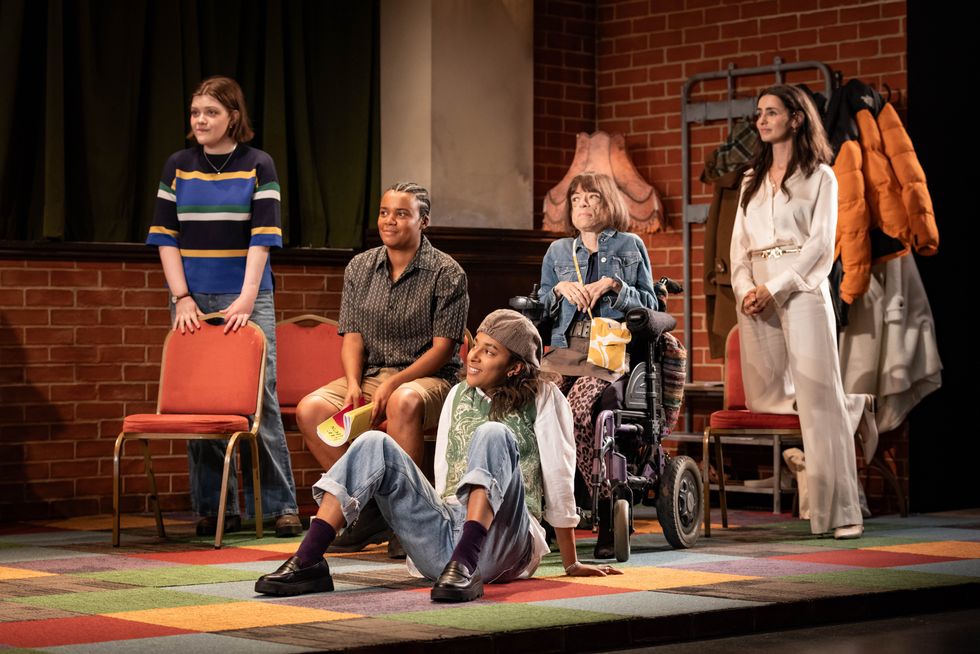 The crew of The Ministry of Lesbian Affairs
The crew of The Ministry of Lesbian Affairs









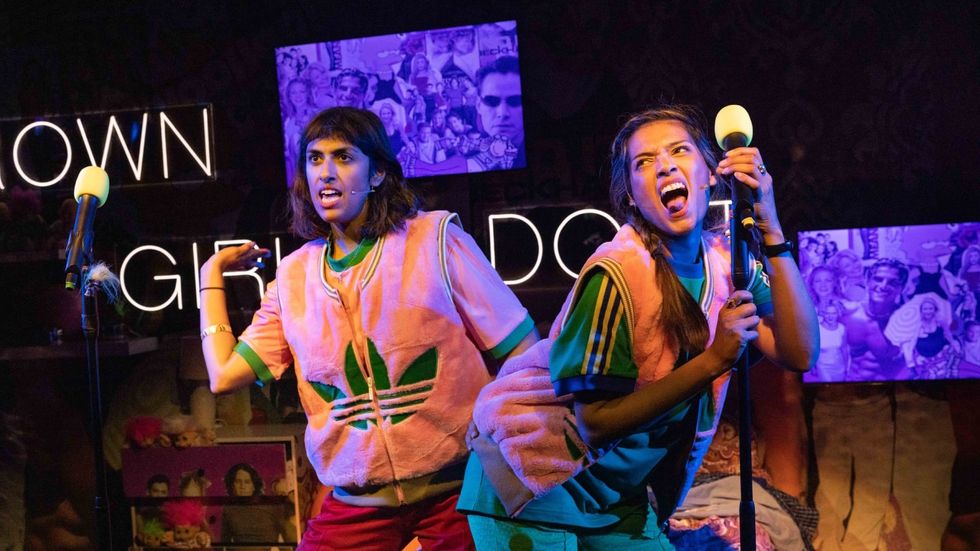 It is rare to witness a show that is both this hilarious and this importantAMG
It is rare to witness a show that is both this hilarious and this importantAMG
 Hunia Chawla
Hunia Chawla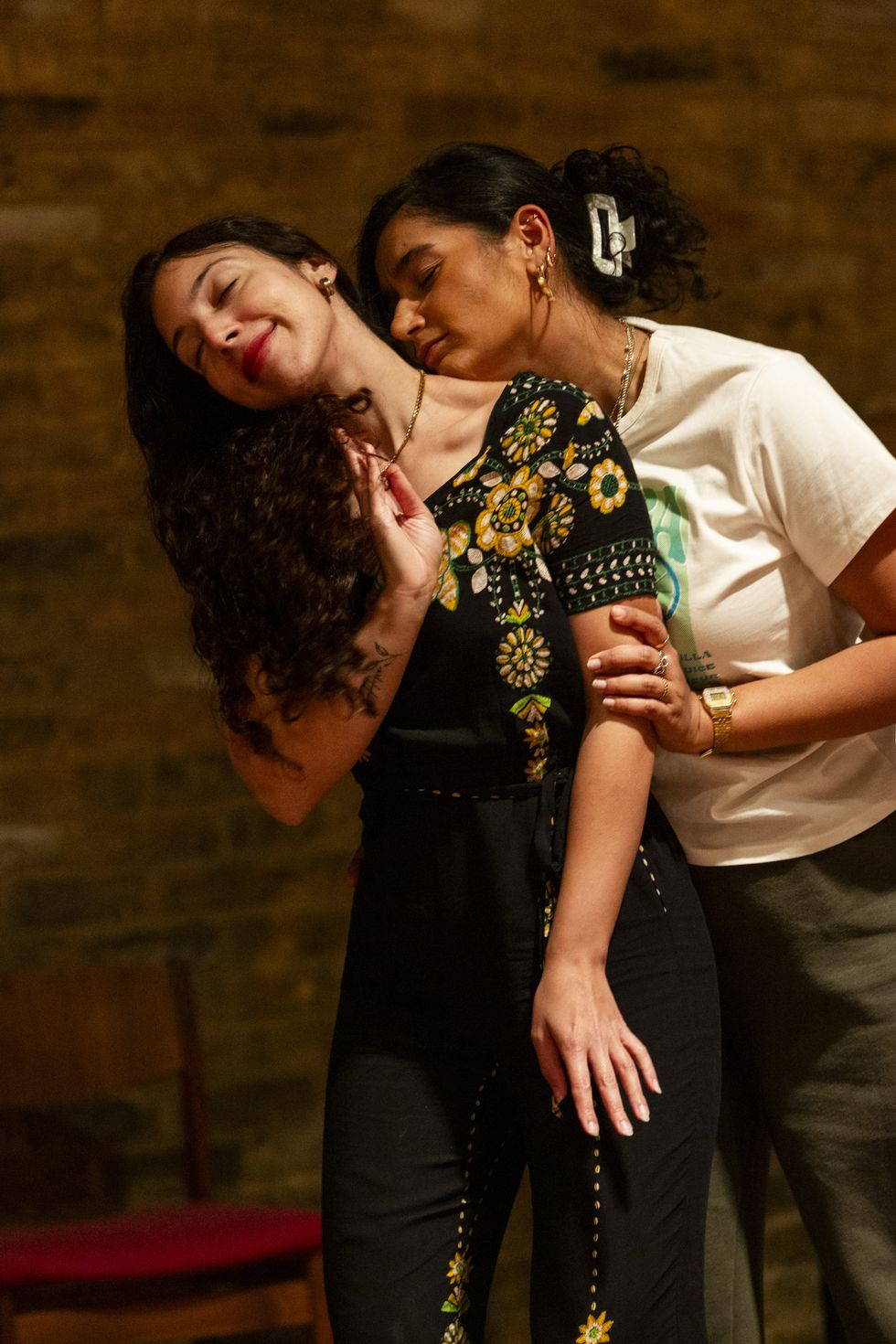 A still from rehearsal
A still from rehearsal
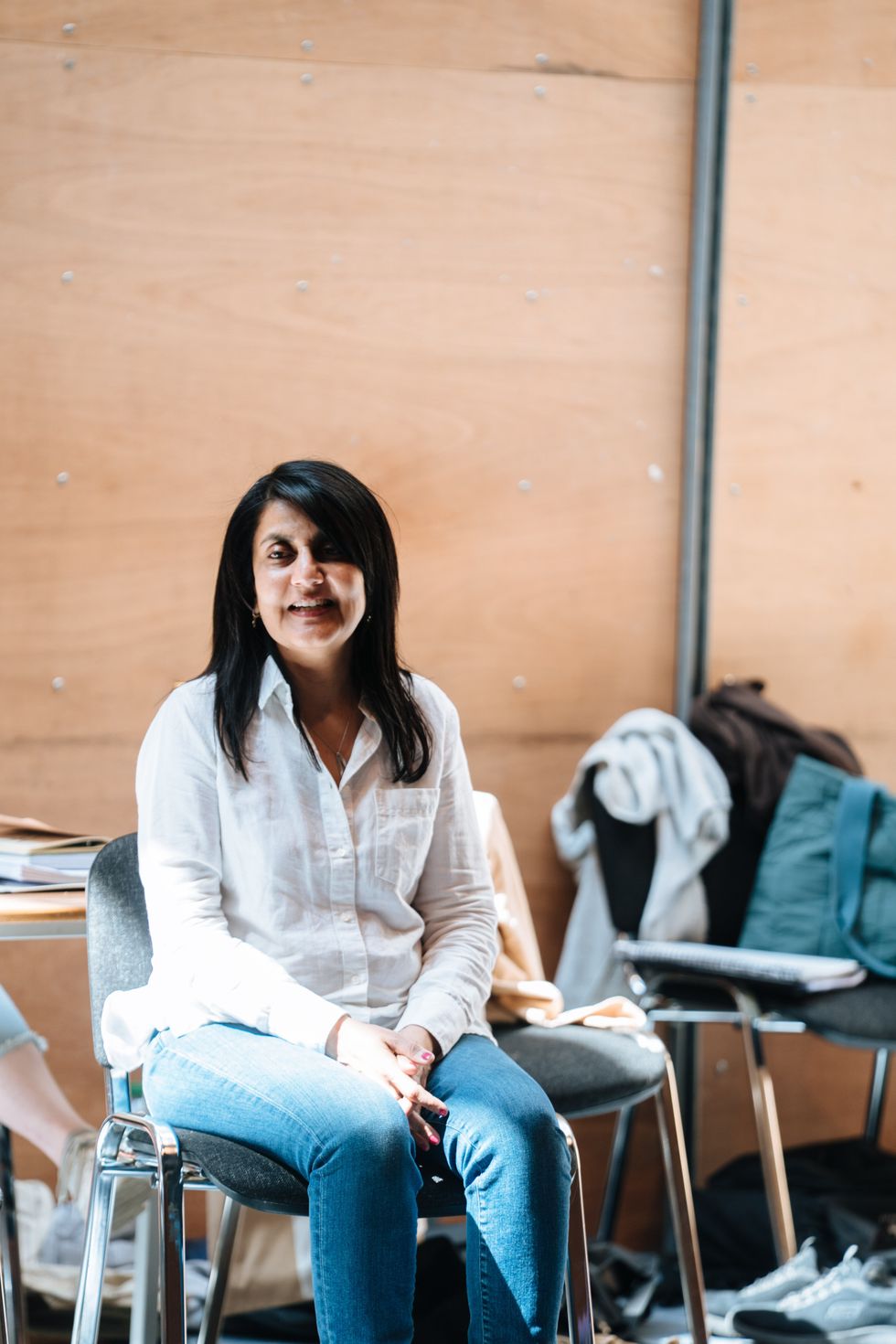 Gurpreet Kaur BhattiHelen Murray
Gurpreet Kaur BhattiHelen Murray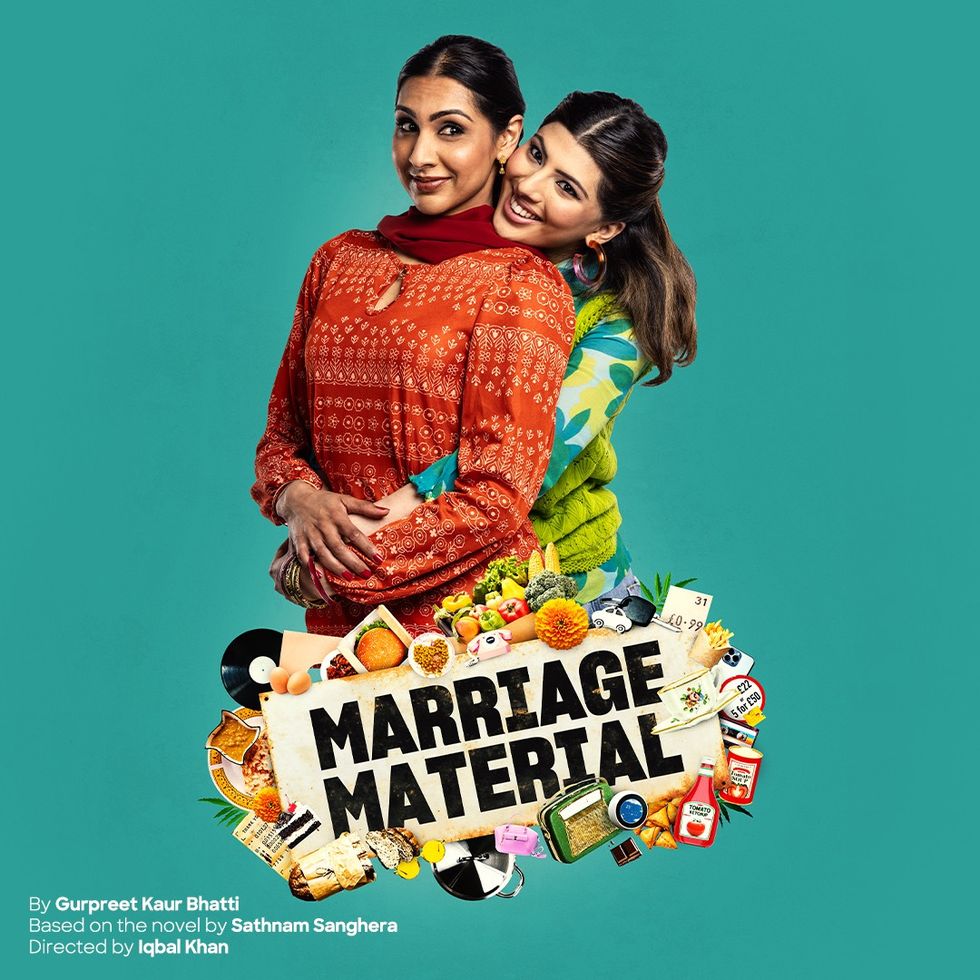 Actresses Kiran Landa and Anoushka Deshmukh in a poster of Marriage MaterialHelen Murray
Actresses Kiran Landa and Anoushka Deshmukh in a poster of Marriage MaterialHelen Murray
The cast of Marriage Material in key moments from the play, including Avita Jay, Kiran Landa, Omar Malik, Irfan Shamji and Anoushka Deshmukh
Sathnam Sanghera’s 'Marriage Material' adapted into bold new play on conformity
The play Marriage Material at the Lyric Hammersmith Theatre is Gurpreet Kaur Bhatti’s adaptation of Sathnam Sanghera’s novel of the same name, which first came out in 2013.
She is lucky to have Iqbal Khan direct Marriage Material. The play, a co-production with the Birmingham Rep, is set in the late 1960s. Mr and Mrs Bains (played by Jaz Singh Deol and Avita Jay) run a corner shop in Wolverhampton. Their younger daughter, Surinder (Anoushka Deshmukh), is 16, her sister Kamaljit (Kiran Landa) is just a bit older.
They have a neighbour, Patwant Dhanda (Irfan Shamji), who, as we shall soon see, is not a very pleasant man. In fact, he comes across just as racist as Enoch Powell, who represented Wolverhampton South West for the Tories from 1950 to 1974.
It will be recalled this was a time when Sikhs working on the buses were told they couldn’t wear a turban. That was a hard-fought battle that had to be won.
The Bains, meanwhile, simply want to get their girls married off.
Nothing new here, I thought.
What makes the tale different is that the plot twists and turns down the generations. Mr Dhanda, who has the makings of a paedophile, makes a pitch for one of the girls when Mr Bains dies early in the play. “A life with no man in the house is no life,” he informs the newly widowed Mrs Bains.
Mr Dhanda has a wife but she has returned to India so he considers himself to be a free man.
Surinder’s English teacher from school, Miss Flanagan (Celeste Dodwell), who is also head of the fifth form, tells Mrs Bains about her daughter: “I don’t want to embarrass you, but she is bright. Ridiculously bright.”
She adds: “Mrs Bains, I think it would be a pity if Surinder didn’t stay on at school.” The initial response from Mrs Bains is not encouraging: “Too much education makes people’s brains get mixed up, they don’t sleep at night…”
But she is finally persuaded that Surinder should be allowed to stay on for a while longer before being married off.
Mr Bains was very old school. When Surinder confides she would one day like to be “a somebody”, he is amused that “my daughter wants to be a somebody”.
“Like you,” she tells her father.
Mr Bains consoles his daughter: “We will find a somebody for you to marry.”
At the point of a possible marriage, however, Surinder is sweet-talked by chocolate salesman Jim Wilson (Tommy Belshaw) into running away with him. They share a love of literature, and he calls her “Sue Bains”. But the relationship does not end well.
Once she has left, Surinder is written off as “dead” by her family. The story that is circulated is that she was only 16 when she was killed in a car crash. That’s better than to let on that she ran off with a white man.
By the time she is reconciled with her sister towards the end of the play, a great deal has changed. Kamaljit married Tanvir Banga (Omar Malik), a young man who helped out in the Bains’ corner shop. When the two sisters meet again, Tanvir has also died. But he and Kamaljit had a son, Arjan Banga (Jaz Singh Deol doubles up for this role after the death of Mr Bains). He has come home after his father’s death to help his mother who is still running the family corner shop.
Meanwhile, Mr Dhanda’s business has prospered. He now has a son, Ranjit Dhanda (the role is taken by Omar Malik after Tanvir’s death), and he is nearly as unpleasant as his father.
Arjan has an English fiancée, Claire (Celeste Dodwell). In London, Arjan worked as a creative director. But after deciding to stay in Wolverhampton to help his mother, he decides he cannot marry Claire because she is white. In other words, Asians are not free of racism, either. Happily, at the end, the couple are reconciled.
As for Surinder, she parted company with Jim Wilson after realising he was all talk, depended on her for money and had failed to earn a penny from his literary pretensions. She had prospered, though, as a hotel owner and had been transformed in time into a well-groomed businesswoman. After being tracked down by Arjan, she decides to return to her roots in Wolverhampton and help Kamaljit run the family corner shop. Perhaps 50 years had passed during the passage of the play.
Being subjected to racism turned some Asians into racists themselves. The word goreh (white person) is repeatedly spat out with venom. Maybe it is worth remembering the play’s audience isn’t exclusively Asian – white folk are watching as well. And maybe some of the toilet humour ridiculing white people, which always makes me cringe, could be cut out.
In Sanghera’s novel, there is a quote from Enoch Powell’s speech in November 1968: “The West Indian or Asian does not, by being born in England, become an Englishman. In law he becomes a United Kingdom citizen by birth; in fact, he is a west Indian or an Asian still... he will by the very nature of things have lost one country without gaining another, lost one nationality without acquiring a new one. Time is running out against us and them. With the lapse of a generation or so we shall at last have succeeded – to the benefit of nobody – in reproducing ‘in England’s green and pleasant land’ the haunting tragedy of the US.”
In Marriage Material, where the acting is marvellous (apart from Mr Dhanda’s Indian mannerisms and accent being overdone) we do travel across a couple of generations.
There is a scene when Tanvir rejects Mr Dhanda’s vision of creating a little Punjab in Wolverhampton.
Mr Dhanda wants to take over the Bains’ corner shop and is putting pressure on Tanvir to sign the papers. He says: “In this country, money is the path to freedom.”
“Sign, please,” he instructs Tanvir. “We must make sure our children learn to behave nicely, according to our rules.”
He insists: “We maintain our identity so we can be ourselves.”
Tanvir disagrees: “We can be us here. With the goreh.”
Dhanda warns him: “Then we will be inviting chaos.”
Tanvir’s comment is telling: “You sound like Enoch.”
Kamaljit, who is expecting a baby with her husband Tanvir, says: “I would like my child to grow up knowing the history of the Gurus and to read the Granth Sahib. And to love their culture.”
Tanvir tells his wife: “I would like my child to go to the finest schools, to cheer for England in the World Cup and eat Yorkshire pudding on a Sunday.”
Kamaljit sets out a dream that has perhaps come to pass with many third and fourth generation British Asians: “Maybe our child can do both.” Much, much later, in a throwback to the past, we learn of Surinder’s O-level results: “Biology A, Chemistry A, English Language A, English Literature A, French A, History B, Latin A, Mathematics A, Physics A…”
Kamaljit tells her younger sister: “Never mind about the B.”
And that is quintessentially Asian. Their acting is outstanding.
Marriage Material is at the Lyric Hammersmith Theatre until June 21, and at the Birmingham Rep from June 25-July 5